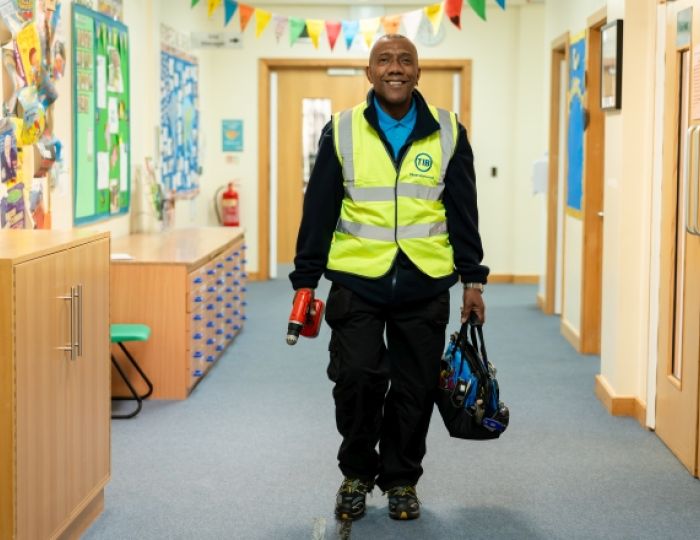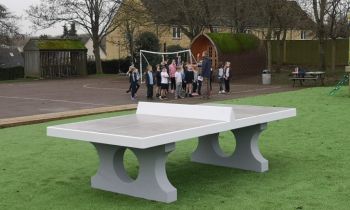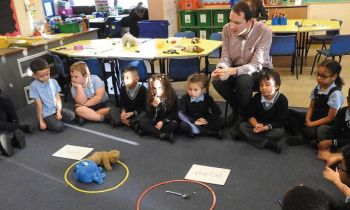How prepared is your school for its new intake of Reception or Year 1 children? Are you aware and mindful of the many hurdles that 4- and 5-year-old children have to overcome as they transition from pre-school to primary school?
Children, like adults, enjoy and are stimulated by novelty and change. That first day of school following the transfer to ‘big school’ is a landmark in the process of growing up. Children look forward to change, even when they’re apprehensive, but as noted in the 1967 Plowden report on primary education, “If change is to stimulate and not to dishearten, it must be carefully prepared and not too sudden.”
A big ordeal
It’s important that leaders and headteachers support their Reception and Year 1 teachers with the development of meaningful transition and settling-in programmes. Teachers need time to get to know the stage of development that each child has reached.
They must understand where the children are in relation to their language acquisition, communication skills, physical abilities, social skills and emotional development before they can accurately construct appropriate learning programmes.
The information required should, in the first instance, be obtained from parents and pre-school centres. Teachers should also have time to collect and analyse their own observations of the children while they engage in well-planned play experiences, as it’s only then that comprehensive plans for learning can be finalised.
However, all too often, detailed planning has already been submitted to leadership teams before the children have even entered the school. When this happens, teachers tend to dismiss what they find out about the children in their anxiety to teach to the previously submitted plans. Teachers regularly report feeling powerless during this process, so perhaps leadership teams could look at alternative planning approaches and submission timeframes for their Reception and foundation stage teachers?
Exemplary practice
Often, when children are transitioning from preschool to primary school, much good work will have already been done by the preschool teams, Reception and Year 1 teachers.
Children will be given opportunities to visit their new school and meet their new teacher, the uniform will be displayed and information about the children will have been passed to the Year 1 teacher.
One extremely useful exercise is for the Year 1 teacher to spend time in a preschool environment observing the children’s competencies, abilities, routines and interests.
It’s not essential that the Year 1 teacher visit or spend time in all feeder preschools; the main purpose of such visits is for Year 1 teachers to absorb how learning takes place in an environment that’s less formal than their primary classroom.
There’s currently a real danger that our Reception and Year 1 classes are moving too fast and too soon towards formal learning in literacy and numeracy, to the detriment of supporting secure development in the physical, social, emotional and communication domains.
In Britain, children enter formal schooling much earlier than they do anywhere else in the world – yet by the age of 7, children around the world typically demonstrate equal and, in some cases higher, levels of ability across all areas. We must therefore question our continued focus on formal learning, testing and labelling at such an early stage in children’s lives.
A virtuous cycle
At this critical transition stage, securing children’s emotional well-being is paramount. Tizzard et al (1988) found that initial success during the Reception class year led to a virtuous cycle, whereby those pupils who made the greatest progress remained high achievers throughout their primary schooling.
We also know from the work of Professor Ferre Laevers at Leuven University in Belgium that high levels of engagement and involvement correlate strongly with deep level learning. He demonstrated through his research that children will struggle to reach high levels of involvement if their emotional wellbeing isn’t secure.
Consider what young children have to get to grips with before they can feel emotionally secure and ready to engage in formal learning. They have to go to school every day and stay for longer hours. Many have to take a packed lunch and only eat when the bell rings. The bell itself is one of the scariest things in many schools, ringing loudly and unexpectedly.
Going to the gym, changing clothes, lining up, waiting, being still and having to be quiet (often with one finger on the lips) are all major tasks, and quite unnatural for young children. And then there’s registration time, playtime, work time, lunchtime, toilet time, home time; all terminology and routines that take time for children to get used to.
What about the sheer size of many school buildings? If you’re 4, they can seem enormous. Children also have to get used to leaving friends behind, making new friends and the presence of bigger children and many more adults.
They have to quickly familiarise themselves with different teaching methods that employ fewer child-led approaches and more formal instruction, and which place greater emphasis on formal literacy, numeracy and recording using pencils and small tools.
Taking precedence
At the time of writing, the DfE is proposing to run a national baseline assessment pilot later in the year. This will entail carrying out 20-minute one-to-one tasks with individual pupils during their first six weeks in reception class.
After much consideration, the DfE opted to remove the testing and measuring of self-regulation from its baseline assessment, agreeing that observational assessment would be more suited to this content area.
The baseline assessment will thus now focus on tasks relating to mathematics, literacy, communication and language. Whilst I agree that self-regulation shouldn’t be tested, I fear that we’re in danger of valuing what we assess, rather than assessing what we value. The danger is that mathematics and literacy will now take even more precedence over social and emotional development.
I believe that we should refrain from formally testing children as they enter reception and Year 1. Children at this stage are already experiencing many changes without having to endure a test – one that’s likely to be administered to the children out of context and in an unfamiliar environment.
Teachers, given appropriate training and understanding of child development, can readily collect the same information about children via observation over the course of a carefully planned and developmentally appropriate settling-in period.
Transition is not a bad thing, but we do need to think more carefully about what change means for children – and we need to plan more carefully, so that the transition process can be smoother for, and supportive of, children.
Clare Devlin is a provider of primary and Early Years training for individuals, early years settings, primary schools and other organisations; follow her at @ClareDevlinEEC.










